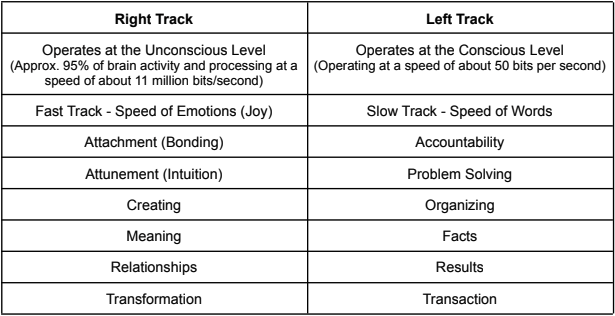Where Neurology Meets Theology
Joy.
Not a word we often associate with leadership and team development. We typically think of joy as a buoyant and bubbly emotion - a feeling that comes and goes based on life circumstances. For some of us, simply mentioning the word “joy” triggers flashbacks to a time singing at church camp the classic, “I’ve got the joy, joy, joy, joy down in my heart (where?) ... down in my heart (where?) ... down in my heart to stay!” Yet, based on the past two decades of brain research, there couldn’t be a more critical emotion essential to brain health, character development, and team formation. Our brain is a relational system that runs both on the “fuel of joy” and at the “speed of joy” - as the ancient Jewish leader, Nehemiah, stated: “the joy of the Lord is our strength” (Neh. 8:10).
Our brain operates on two tracks - a right track (relational circuitry) and a left track (rational circuitry), designed to work together in harmony - in “synchronicity.” What is critical for us to understand is that the right track is primary and fuels (‘informs’) the left track. The left track supports and responds to the right side. Our mental processing starts with the right and then proceeds to the left. Here is a chart contrasting both tracks:

In their game-changing book, The Other Half of Church - Christian Community, Brain Science, and Overcoming Spiritual Stagnation, Wilder and Hendricks state:
The right brain integrates our life, including our connection to loved ones, our bodies, our surroundings, our emotions, our identities, and our community. Character formation flows out of these connections. The right brain processes these questions: Who is happy to see me here? What do I feel right now? Is there anyone here who understands me? How do I act like myself right now? What do my people do in this situation? The answers to these questions drive our character development. If you are like me, you need to read that again: our right brain depends on relational input to form our character. Much of this processing is nonverbal and preconscious. Keeping our relational right brain running smoothly creates the optimum environment for character transformation.
They continue:
Every one-sixth of a second our right brain tries to answer the questions, “Who am I? How do my people act now?” If my control center is working smoothly, my circumstances are integrated with my group identity. I spontaneously act with joy and peace. If my control center desynchronizes, I forget who I am and how to connect with those around me. I stop acting like myself. Even though I am a Christian, I stop acting like one. My brain has cramped. I no longer act with compassion, kindness, humility, gentleness, and patience.
These insights are revolutionary! The majority of our organizations, churches, and teams are half-brained - functioning primarily from the left-brain hemisphere. No wonder leaders and organizations are experiencing high levels of toxicity and low levels of transformation. Another key learning from neuroscience is that if the brain is not fueled by joy, it will switch to being fueled by fear - leading to so many personal and team dysfunctions and trauma, hindering people from living and leading out of a place of health and vitality. A fear-based right brain is like giving the left brain a deflated basketball and saying, “get playing!” When the right side is filled with joy, the basketball has got all the air it needs, providing the bounce for the left side to succeed in its role.
What practices can we engage in to create joyful encounters and environments for our right track to flourish, allowing people to establish and live from healthy individual and group identities, and experience the life change they were created for? Before we look at some practices, a couple of essential points:
- Joy needs to be understood as a relational dynamic, where we define joy as “glad/delighted-to-be-together.” It is the emotion one experiences when they are in the company of a person (or people), knowing they truly matter, are fully appreciated for who they are - where there is a deep, abiding, and genuine enjoyment in being with each other.
- Modeling/Imitating: As discussed, the right track of our brains is relationally wired and, therefore, requires exposure to and immersion in relational interactions and behavior that can be observed, absorbed, and ultimately imitated to function well. Our brains have what are called “mirror neurons” that imprint the behaviors we see, which in time influence how we behave. The key, however, is exposure to healthy, loving, and mature behaviors that can be reproduced in the lives of those watching and participating. And this is why modeling healthy, joyful behaviors are so important to individual and team transformation.
Here are concrete practices to engage in and model:
- Regularly ask your team questions like, “Who Are We?” and “How Are We to Act?” to tap into and reinforce your group identity. Revisit your core values and behaviors with both regularity and consistency.
- Engage in face-to-face (eye-to-eye) contact when connecting and conversing with people. Nothing is more potent than encountering a joy-filled face (smiles and all) that conveys delight in seeing and being with you (see Becoming a Face of Grace by Ed Khouri for more on this).
- Express curiosity by exhibiting a genuine and invested interest in people (their hopes, dreams, passions, and life challenges and disappointments).
- Provide affirmation, appreciation, validation, and recognition to people. Always be on the lookout for what people are doing, noticing things that can be authentically acknowledged and celebrated.
- Provides safe spaces for people to process unhealthy emotions. So many people are carrying ungrieved pain and disappointment - let them grieve and ultimately heal.
(To go deeper, check out the following resources: Thrive Today and Life Model Works).
At Chemistry Staffing, we prioritize relationships over results transformation over transactions. We know the moment you reverse this, you create a competing culture instead of a completing one. We believe that results flow out of healthy, joy-filled relationships. We would consider it our joy if we could begin a relationship serving you with a staff search or ministry development. Please connect with us!
To connect with Allan about finding a long-term healthy fit or to talk about church health, reach out to him via email here.





